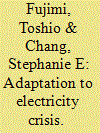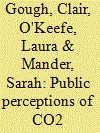|
|
|
Sort Order |
|
|
|
Items / Page
|
|
|
|
|
|
|
| Srl | Item |
| 1 |
ID:
133222


|
|
|
|
|
| Publication |
2014.
|
| Summary/Abstract |
Electricity crises can spur improvements in electricity conservation that would be unachievable under normal circumstances. This paper investigates how businesses adapted to electricity shortages following the March 11, 2011, Great East Japan earthquake, tsunami, and nuclear disaster. In summer 2011, mandatory and voluntary electricity conservation measures affected nearly all of Japan, and peak hour electricity consumption was reduced by a remarkable 18% in the Tokyo region. Using statistical data from 14 business surveys conducted in 2011 and 2012, this paper identifies patterns with regard to type of adaptation, conservation requirements, economic sector, and timeframe. Results indicate that behavioral adaptations (e.g., reduction of illumination or air conditioning) were much more common than schedule adaptations (e.g., shifting production times) or hardware adaptations (e.g., installing energy-efficient devices or private generators). Adaptation patterns were very similar between mandatory and voluntary conservation areas. Manufacturing companies were more likely to implement schedule adaptations than other companies. Certain types of adaptations persisted into 2012, especially reduction of illumination and air conditioning, and installation of energy-efficient devices. These insights may be useful for informing electricity conservation policies in non-crisis contexts.
|
|
|
|
|
|
|
|
|
|
|
|
|
|
|
|
| 2 |
ID:
133228


|
|
|
|
|
| Publication |
2014.
|
| Summary/Abstract |
Energy poverty and fuel poverty are descriptors of problems of households' energy consumption, they are both distinct problems and have been addressed by many researchers, organizations and governments. Cross use of the terms of energy poverty and fuel poverty in published papers is common. As an accurate descriptor is the presupposition of research and policy development, especially for those who just started to pay attention to this issue, this paper compares the definitions, research priorities, status quo, and problems of these two concepts, and summarizes the relationship between them. The paper suggests that only when the research targets are households who are living in a cold climate and have difficulty in getting access to electricity or modern cooking facilities, and in supplying indoor heating with appropriate cost, the concepts of energy poverty and fuel poverty have the chance to be broadened and mutually integrated.
|
|
|
|
|
|
|
|
|
|
|
|
|
|
|
|
| 3 |
ID:
132767


|
|
|
|
|
| Publication |
2014.
|
| Summary/Abstract |
Governments deciding to use nuclear energy as part of their country×s energy mix are faced with long-term planning efforts and huge investments. As nuclear power plants constitute one of the socially and politically most contested technologies, the question arises, which time horizons companies as well as politicians have to consider for the accomplishment and grid-connection of individual and whole fleets of reactors. Unfortunately, there are no large-N studies investigating the time for completion of such large-scale projects. For the first time, we statistically explain the duration of the construction of all initiated nuclear plant projects so far. Based on the International Atomic Energy×s comprehensive Power Reactor Information System (PRIS) we assess the impact of demographic, economic, and political preconditions of a country, at the same time accounting for different types of reactor technologies. To account for non-linear relationships, we apply non-parametric survival models with P-splines. A main result of our analysis is that time of connection to grid increases over the years indicating increased societal sensibilities, respect for higher security standards, and increased project complexities. The Harrisburg and the Chernobyl disaster did not induce a separate additional delaying effect.
|
|
|
|
|
|
|
|
|
|
|
|
|
|
|
|
| 4 |
ID:
133224


|
|
|
|
|
| Publication |
2014.
|
| Summary/Abstract |
Using panel data of 24 countries in the Middle East and North African (MENA) region from 2001 to 2009, the purpose of this study is to examine the impacts of tourism, energy consumption and political instability on economic growth within the neoclassical growth framework. To address the objective of this study, we utilise both the static panel data approach as well as the dynamic generalised method of moments (GMM) estimator to examine the impact of candidate variables. Our results show that energy consumption and tourism significantly contribute to the economic growth of countries in the MENA region. Hence, our study lends some support to the existence of the tourism-led growth and energy-led growth hypotheses in the region. In line with our expectation, our estimation results also reveal that political instability impedes the process of economic growth and development in the MENA region. Therefore, macroeconomic policies to promote expansion in tourism and energy consumption will directly stimulate economic growth. Additionally, efforts to help the region overcome its history of political instability would attract more international tourist arrivals and further invigorate economic growth.
|
|
|
|
|
|
|
|
|
|
|
|
|
|
|
|
| 5 |
ID:
132759


|
|
|
|
|
| Publication |
2014.
|
| Summary/Abstract |
This paper explores the response by members of the lay public to the prospect of an onshore CO2 pipeline through their locality as part of a proposed CCS development and presents results from deliberative Focus Groups held along a proposed pipeline route. Although there is a reasonable level of general knowledge about CO2 across the lay public, understanding of its specific properties is more limited. The main concerns expressed around pipelines focused on five areas: (i) safe operation of the pipeline; (ii) the risks to people, livestock and vegetation arising from the leakage of CO2 from the pipeline; (iii) the innovative and 'first of its kind× nature of the pipeline and the consequent lack of operational CO2 pipelines in the UK to demonstrate the technology; (iv) impacts on coastal erosion at the landfall site; and (v) the potential disruption to local communities during pipeline construction. Participants expressed scepticism over the motivations of CO2 pipeline developers. Trust that the developer will minimise risk during the route selection and subsequent construction, operation and maintenance of the pipeline is key; building trust within the local community requires early engagement processes, tailored to deliver a variety of engagement and information approaches.
|
|
|
|
|
|
|
|
|
|
|
|
|
|
|
|
|
|
|
|
|